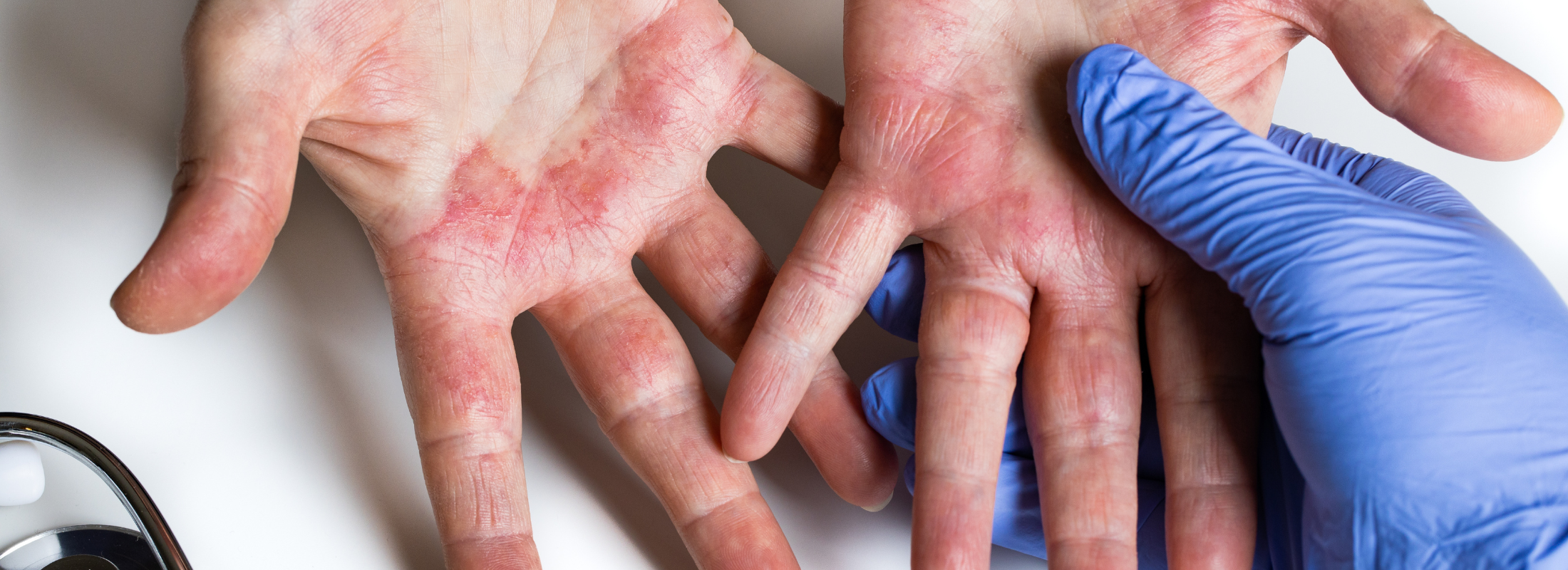
Table of Contents
Dermatitis is a common skin condition that affects millions of people worldwide. It is characterized by inflammation, itching, and redness of the skin. There are different types of dermatitis, each with its own causes and symptoms. In this article, we will explore the various types, their symptoms, and the available medical and at-home treatment options.
Types of Dermatitis
Eczema:
Atopic dermatitis, also known as eczema, is a chronic condition that often develops in early childhood and may persist into adulthood. It is commonly associated with allergies or asthma. Individuals with atopic dermatitis experience dry, itchy, and scaly skin. Common triggers for flare-ups include certain foods, environmental factors like pollen or dust mites, and irritants like soaps or detergents.
Contact Dermatitis:
Occurs when the skin comes into direct contact with an irritant or allergen. There are two main types: irritant contact dermatitis and allergic contact dermatitis.
- Irritant Contact Dermatitis: Caused by exposure to chemicals or substances that damage or irritate the skin. It can occur in anyone, even those without specific allergies. Symptoms include redness, itching, burning, and the formation of blisters or dry, cracked skin. Common triggers include certain soaps, detergents, solvents, and chemicals found in cleaning products.
- Allergic Contact Dermatitis: Triggered by an allergic reaction to a specific substance. It occurs when the immune system overreacts to an allergen, resulting in skin inflammation. Symptoms may include redness, itching, swelling, and the formation of blisters. Common triggers include certain metals (like nickel), fragrances, cosmetics, latex, and plants such as poison ivy or poison oak.
Seborrheic Dermatitis:
A common form of dermatitis that primarily affects areas rich in oil glands, such as the scalp, face, and upper chest. It is characterized by greasy or scaly patches of skin, redness, and itchiness. Factors such as hormonal imbalances, a yeast called Malassezia, and genetics may contribute to its development.
Symptoms
- Itching: Itching is a hallmark symptom of dermatitis and can be extremely bothersome. The urge to scratch can be intense, leading to skin damage and potential complications. Managing itching is crucial for relieving discomfort and preventing further irritation.
- Redness and Inflammation: The intensity of redness may vary depending on the type and severity of the condition. Inflamed skin can be sensitive and may feel warm to the touch.
- Dryness and Scaling: Dryness and scaling of the skin is common. This can lead to a rough or flaky texture, further contributing to itching and discomfort. Proper moisturization is vital for maintaining skin barrier function and preventing excessive dryness.
Medical Treatments
Topical Steroids: Topical corticosteroid creams or ointments are commonly prescribed to reduce inflammation and relieve symptoms. They come in various strengths and should be used according to the instructions provided by a healthcare professional. It’s important to follow the recommended duration of use and avoid overuse or abrupt discontinuation.
Immunosuppressants: In cases of severe or chronic dermatitis that do not respond well to other treatments, immunosuppressant medications may be prescribed. These drugs work by suppressing the immune system to reduce inflammation and control symptoms. They are typically used under close medical supervision due to their potential side effects.
Antihistamines: Antihistamines can help alleviate itching and provide some relief. These medications block histamine, a chemical released during an allergic reaction, which can reduce itching and promote better sleep. Antihistamines are available in both over-the-counter and prescription forms and may cause drowsiness in some individuals.
Moisturizers and Emollients: Regular moisturization is crucial for managing dermatitis. Using fragrance-free, hypoallergenic moisturizers and emollients helps restore the skin’s moisture barrier and prevent dryness. Applying these products immediately after bathing or showering can help seal in moisture.
At-Home Treatments and Self-Care
Avoiding Triggers: Identifying and avoiding triggers specific to your type of dermatitis is essential. Whether it’s certain foods, chemicals, cosmetics, fabrics, or environmental factors, minimizing exposure to these triggers can significantly reduce the frequency and severity of flare-ups.
Gentle Skincare Routine: Establishing a gentle skincare routine is vital for individuals with dermatitis. Use mild cleansers, lukewarm water, and avoid scrubbing or rubbing the skin vigorously. Gently pat the skin dry with a soft towel.
Moisturizing: Regular moisturization is key to managing dermatitis. Apply moisturizers and emollients liberally and frequently throughout the day, especially after bathing. Opt for products that are free of fragrances, dyes, and other potential irritants.
Cool Compresses: To relieve itching and reduce inflammation, apply cool compresses or wet dressings to the affected areas. The cool temperature can provide temporary relief and soothe the skin.
Stress Management: Stress can worsen dermatitis symptoms. Engaging in stress-reducing activities such as meditation, exercise, or counseling can help manage stress levels and improve overall well-being. Finding healthy coping mechanisms is essential for individuals with dermatitis.
Conclusion
Dermatitis can be a challenging skin condition to manage, but understanding its different types, symptoms, and treatment options is crucial for effective care. Whether through medical treatments like topical steroids or immunosuppressants, or at-home remedies such as avoiding triggers and practicing a gentle skincare routine, there are various ways to alleviate symptoms and maintain healthy skin. If you suspect you have dermatitis, consult with a healthcare professional for a proper diagnosis and personalized treatment plan.
Remember, everyone’s experience with dermatitis may vary, so it’s essential to work closely with a healthcare provider to find the most suitable treatment approach for your specific needs.
Our Urgent Care
At Our Urgent Care Center, we prioritize your well-being and offer comprehensive services to address your healthcare needs. Our experienced medical staff and providers are dedicated to delivering high-quality care and ensuring your comfort throughout the treatment process. Whether you require treatment for sinusitis, common illnesses, or injuries, our team is well-equipped to provide prompt and effective care. With on-site low dose x-rays, and lab testing available, we can provide a prompt diagnosis. We also partner with many small and large businesses, as well as corporations, to provide occupational medicine focused on the prevention and treatment of occupational injuries and diseases.
Please note that the information provided in this blog post is for general informational purposes only and should not substitute professional medical advice. It is always recommended to consult with a healthcare professional regarding your specific condition or symptoms.
If you are experiencing life threatening symptoms, or severe pain; visit the nearest ER or dial 911 immediately.
Sources:
© Excel Urgent Care and Affiliates 2023

